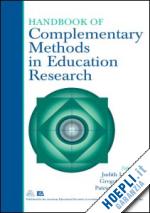Contents: L.A. Shepard, Preface.J.L. Green, G. Camilli, P.B. Elmore, Introduction to the Handbook: What's Complementary About Complementary Methods. A. Skukauskaite,E. Grace, OnReading and Using the Volume: Notes to Students.Part I: Foundations. E. Bredo, Philosophies of Educational Research. G.J. Kelly, Epistemology and Educational Research. K.A. Strike, The Ethics of Educational Research. Part II: Introduction to Design & Analysis. C. Bazerman, Analyzing the Multidimensionality of Texts in Education. T. Barone, Arts-Based Educational Research. R.K. Yin, Case StudyMethods.K.M. Borman, C. Clarke, B. Cotner, R. Lee, Cross-Case Analysis.A.C. Porter, Curriculum Assessment. K.H. Kim, P.M. Bentler, Data Modeling: Structural Equation Modeling. F. Erickson, Definition and Analysis of Data From Videotape: Some Research Procedures and Their Rationales.A.H. Schoenfeld, Design Experiments. H-Z. Ho, S.L. O'Farrell, S. Hong, S. You, Developmental Research: Theory, Method, Design, and Statistical Analysis. D. Bloome, C. Clark, Discourse-In-Use. H. Braun, Empirical Bayes. J.P. Shaffer, Estimation. K.M. Anderson-Levitt, Ethnography. J. Nespor, Finding Patters With Field Notes. R.J. Shavelson, N.M. Webb, Generalizability Theory. J.L. Rury, Historical Research in Education. A. Henry, Historical Studies: Groups/Institutions. M.E. Brenner, Interviewing in Educational Research. L. Crocker, Introduction to Measurement Theory. S. Embretson, X. Yang, Item Response Theory. D.M. Harrison,S.W. Raudenbush, Linear Regression and Hierarchical Linear Models. G.V. Glass, Meta-Analysis: The Quantitative Synthesis of Research Findings. C.A. Chinn, The Microgenetic Method: Current Work and Extensions to Classroom Research. M.L. Smith, Multiple Methodology in Education Research. F.M. Connelly, D.J. Clandinin, Narrative Inquiry. N.C. Burbules, B.R. Warnick, Philosophical Inquiry. M. Cochran-Smith, K. Donnell, Practitioner Inquiry: Blurring the Boundaries of Research and Practice. J.R. Levin, Probability and Hypothesis Testing. W.R. Shadish, J.K. Luellen, Quasi-Experimental Design. T.D. Cook, V. Sinha,Randomized Experiments in Educational Research. M. Eisenhart, Representing Qualitative Data. B. Thompson, Research Synthesis: Effect Sizes. H. Wainer, P.F. Velleman, Statistical Graphics: A Guidepost for Scientific Discovery. M. Berends, Survey Methods in Educational Research. J. Chromy, Survey Sampling.Part III: Programs of Research. C. Genishi, T. Glupczynski, Language and Literacy Research: MultipleMethods andPerspectives. L.M. McNeil, E.M. Coppola,Official and Unofficial Stories: Getting at the Impact of Policy on Educational Practice. M.E. Goertz, Policy Analysis: Studying Policy Implementation. S. Kushner, C. Adelman, Program Evaluation: A Democratic Practice. L.A. Rex,S.C. Steadman, M.K. Graciano,Researching the Complexity of Classroom Interaction. J.A. Banks, Researching Race, Culture, and Difference: Epistemological Challenges and Possibilities. J.G. Greeno, Theoretical and Practical Advances Through Research on Learning. S. Noffke, K. Zeichner, Programs of Research in Teacher Education.











